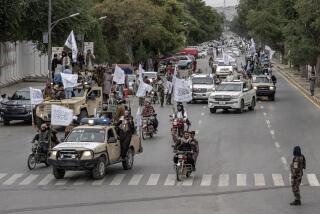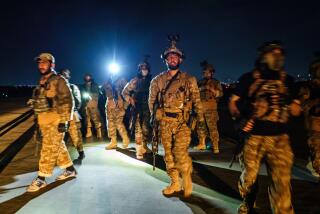1978 Marxist Coup Launched Decade of Turmoil in Afghanistan
- Share via
The following is a chronology of events in Afghanistan:
1978--Afghan government is overthrown in April and Nur Mohammed Taraki is installed as head of a Marxist, pro-Soviet regime.
1979--Taraki is killed in September and succeeded by his deputy, Hafizullah Amin. Amin imposes rigorous and unpopular Communist policies, resulting in an uprising that leads to massive Soviet military intervention in late December. Amin is killed and replaced by Babrak Karmal, who is flown in by the Soviets from exile in Eastern Europe.
1980--Within days of the Soviet intervention, the United Nations calls for “immediate, unconditional and total” withdrawal of foreign troops. President Jimmy Carter imposes sanctions against the Soviet Union, including a halt in the sales of grain and high-technology equipment, and calls for international boycott of the Summer Olympics scheduled to take place in Moscow in July.
1981--President Reagan lifts the embargo on grain sales.
1982--Two years after Moscow’s intervention, 2.5 million Afghans are reported to have taken refuge in neighboring Pakistan, which has also become the base of the Afghan resistance fighters. In June, U.N.-sponsored peace talks open in Geneva between the Afghan government and Pakistan, which represents the rebels.
1984--The Soviet Union refuses to send its athletes to the Summer Olympics in Los Angeles, apparently in retaliation for the 1980 U.S. boycott.
1985--Rival resistance elements agree in January to form a seven-party coalition. In December, the Afghan government proposes a timetable for the withdrawal of Soviet troops.
1986--In May, Karmal is replaced as head of the Afghan ruling party by Najibullah, a former secret police director, who later becomes head of government as well. The resistance reportedly receives in September its first supply of U.S.-made Stinger anti-aircraft missiles. With these, they shoot down many Soviet and Afghan government planes and helicopters, blunting effect of air power in the guerrilla struggle.
1987--In January, the rebels reject any sharing of power with the Communists. By December, Najibullah is saying that Soviet troops could be withdrawn within a year.
1988--Soviet leader Mikhail S. Gorbachev offers in February to withdraw Soviet troops starting May 15 if the Geneva talks produce an agreement by March 15. Another round of talks opens in Geneva on March 2, but is stalled by disagreement on continued military aid to both sides and the makeup of a post-settlement Afghan government. Soviet Foreign Minister Eduard A. Shevardnadze flies to Kabul in early April to work out a plan to withdraw Soviet troops in the event the Geneva talks fail. On April 7, Gorbachev and Najibullah meet in Tashkent, in Soviet Central Asia, and say afterward that all obstacles to an agreement have been cleared. On April 8, the U.N. mediator in Geneva announces that a peace settlement is complete and ready to be signed by April 14.
More to Read
Sign up for Essential California
The most important California stories and recommendations in your inbox every morning.
You may occasionally receive promotional content from the Los Angeles Times.













